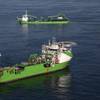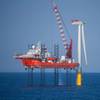Harness the Energy: Deliver the Prosperity
A new year brings resolutions and renewed optimism for better times, and sometimes a wish for things to at least not get any worse. For the offshore energy industry, 2013 brings a combination of all. The economy is showing signs of life and exploration and production are making a comeback in the Gulf of Mexico. After much upheaval and turmoil, the Bureau of Safety and Environmental Enforcement (BSEE) and the Bureau of Ocean Energy Management (BOEM) are filling their ranks and an era of more predictability and consistency appears to be on the horizon. Energy companies have a better idea of what is expected of them in the various permit application processes and the Federal agencies are reducing the time it takes to review and either approve or disapprove of the various permits.
2012 proved to be the year of more: -- more documentation and paperwork needed for permit applications and more time needed to evaluate the additional material. More will likely be the new norm; there will be more inspections, more requirements and more rule making. However, it appears there will be more coordination, cooperation and communication between industry and the regulators to clarify what is expected and what is demanded as we head into 2013. To fFollowing is a list of key issues to watch.
Jobs and the Economy
Of course, the first is the most difficult. First, you don’t single out and punish the industry that was one of the few bright spots of economic development for the past 2 years, that being the oil and natural gas industry. This sector outpaced the nation’s average job growth rate and has put the United States on the verge of being a natural gas and an oil exporter. It is difficult to find an economic expert who isn’t saying Congress and the Administration need to revamp the entire tax system. Such a worthwhile endeavor will not be easy and was never meant to be easy, but we are past due for such an overhaul.
A successful overhaul effort means all industries are at the table, and a full discussion is held on the appropriate corporate tax rate across the board, including, but not limited to, the traditional and nontraditional energy, technology and manufacturing sectors. In addition, all areas of government spending should also be scrutinized and we need a frank and honest discussion of what our government should and should not provide. Will there be hard questions? Yes. Will there be hard answers? Absolutely, but the American people should demand such a process.
Safety
The taxing and spending process may leave time for little else, but there are also areas in which the Congress need not tread at this time. Critics of the offshore oil and gas industry lambast Congress for not doing more to make sure offshore energy exploration and development is safe. However, the fact that Congress has not enacted drastic changes to the existing laws and regulations does not mean that the offshore world is not safe. Safety is always the number one priority and companies are continually striving to improve the safety of operations. Most of the people who work offshore live in coastal areas, particularly in the Gulf of Mexico. It is their home. The workers are their family and neighbors, all sharing a common goal of wanting to return safely from work and live and recreate in a productive and natural resources rich environment. The Gulf of Mexico not only provides a work place, but also a place to boat, swim, dive and fish. The oil and natural gas industry recognizes the Gulf as a treasure and has no desire to poison the well.
Industry has the knowledge and technology to make changes in safety, and has been doing so. According to the latest statistics from BSEE, incidents involving fatalities, injuries, fires and number of spills have been on a downward trend over the last five years. Of course, this is an industry that ooperates in a difficult environment and often harsh conditions. The risk of an accident will likely never be completely eliminated, but it appears the actions taken by industry are working. All accidents should be thoroughly investigated and analyzed in a cooperative manner between the company and the Federal regulator to determine what went wrong and why. Any sweeping changes in either safety or liability by Congress should not be made hastily or without thorough understanding that flexibility and promotion of technological advances can often be staunched by statutory mandates that might be outdated in a few years.
Increase Access
Now, what else could Congress do? Congress and the Administration should add more offshore areas for oil and natural gas exploration and development. Federal policies limit exploration and development to about 15% of the outer continental shelf (OCS). That means 85% of the OCS is closed to exploration. Are there marketable amounts of oil and natural gas in that 85%? If the Gulf of Mexico is any indication, there certainly is. But we don’t know the true amounts, and won’t know, without looking. The current five year plan does not open up any new areas for oil and natural gas exploration, but Congress could open up more areas through legislation and should do so.
There is strong political support for opening up areas off the coasts of Virginia and South Carolina. Those areas would be a good start. Opponents of increased offshore oil and natural gas development often claim that it would take ten years or more before we saw any production from those new areas. In some cases that might be true, but had we started ten years ago, we wouldn’t be having this argument. In addition, energy forecasts indicate that oil and natural gas will continue to be dominant components of our energy supply for generations to come. We will need those presently untapped ssupplies, not only for our energy reliability and security, but also to fulfill predictions that the U.S. will become a leader in oil and natural gas production around the end of this decade. Opening up new areas, coupled with increased development of nontraditional sources of energy, such as offshore wind, wave and current will contribute greatly to our long term economic stability and well-being.
Elections have consequences, yes. Yet Americans expect their leaders, even if they didn’t vote for them, to make America a better place in which to live and work. Recognizing and harnessing the value of existing and prospective offshore energy resources to our nation’s prosperity is not too much to ask.
(As published in the January 2013 edition of Marine News - www.marinelink.com)











